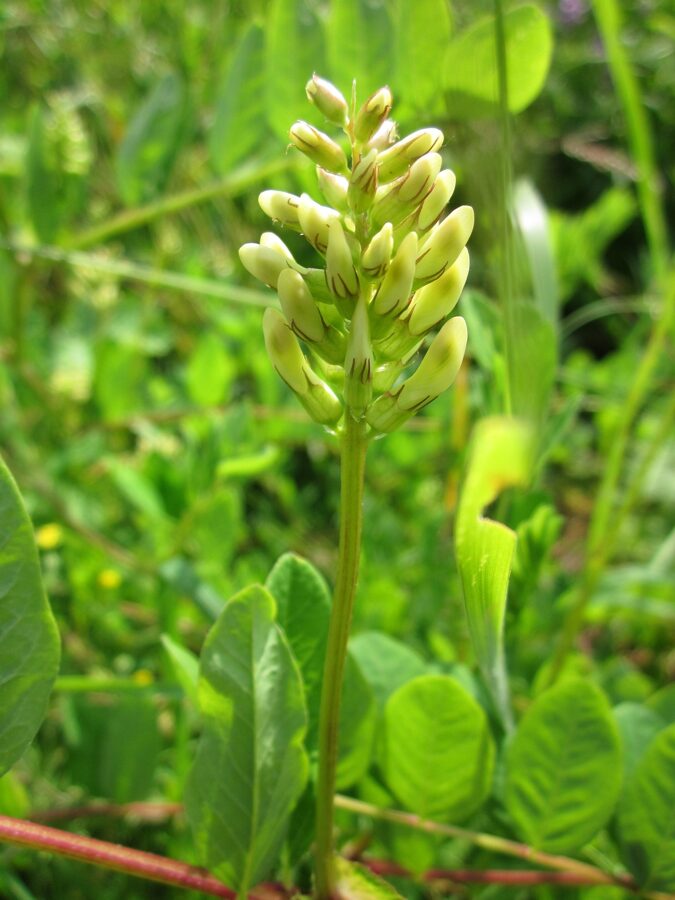 |  |  |  |  |
 |  |
Wild Liquorice is a perennial plant with a long (<1m), creeping and erect stem. The leaves are arranged in odd tufts, 10-20 cm long, with 4-7 pairs of elliptic leaves. The flowers are green-yellow, arranged in an elongated oval cluster. In long flower stalks, at the top of the plant, which are formed in leaf axils. Fruits - a pod, slightly sickle-shaped, 3.5-4 cm long. Blooms in May-June, seeds ripen in June-July. The leaves have a sweet taste.
For medicinal purposes, wild Liquorice is collected during flowering, in the months of June-July. It is important to harvest the plant before the pods mature. However, in order not to damage the stands, it is important to leave a few plants for seed maturation and sowing. There should be no signs of disease such as powdery mildew or rust on the leaves. The drug can be stored in ventilated containers for up to 2 years.
Wild Liquorice contains asparagine, vitamin C, vitamin P, glycyrrhizin, tannins and bitters, essential oils, saponins, flavonoids. Leaves contain essential oils, rutin, tannins and alkaloids.
Medicinal significance
Wild Liquorice has been scientifically proven to strengthen the immune system, fighting various ailments, including oncology and heart disease. The plant is able to partially restore the immune function of cells. Studies have shown its ability to reduce the duration of colds. The plant is able to stimulate the body, increase the production of interferon.
In 2006, Wild Liquorice and its effect on lung cancer were studied and it was concluded that the plant is able to enhance the effect of platinum chemotherapy based on the drug cisplatin. Research is still ongoing, but more and more scientists mention that the plant improves the ability to overcome the therapies that have to go through during oncology treatment.
Wild Liquorice helps treat burns, protects against heart disease, helps fight colds and body weakness.
The plant has gained special recognition in China. There it is considered an elite remedy, which is added to food and medicinal products. This plant is also valued in Tibet, Mongolia and India.
Wild Liquorice improves the functioning of the immune system, it stimulates its protection, accordingly, it helps to fight against various ailments, regulates the metabolism, and also helps to get rid of toxins. Traganese dilates blood vessels, lowering blood pressure and making the heart work easier.
The plant improves liver function by cleansing this organ, reduces blood sugar levels, which is relevant in diabetes, has a mild diuretic effect, which helps reduce edema.
Wild Liquorice is a valuable plant for the female body, it helps not to age and maintain feminine beauty. It normalizes the hormonal background in women after the age of 40. The plant is also used for oral rinses, in case of various female diseases.
Clinical studies have shown that using tragacanth extract improves the well-being of patients, headaches, dizziness, ringing in the ears, insomnia, paresthesia, palpitations and pain in the heart disappear. In capillaroscopic studies, it has been observed that blurring of vision disappears, capillary function improves, and narrowing of blood capillaries decreases. Improvements were also observed in CNS, heart and kidney blood supply processes.
Venous blood pressure decreased, diuresis increased, edema, shortness of breath, cyanosis decreased in heart patients with circulatory failure, dystrophic processes in the myocardium.
Improvements have also been seen in treating people with acute and chronic glomerulonephritis. In patients, renal blood circulation and plasma flow improve, renal resistance decreases, filtration increases, and renal blood vessels expand more than the blood vessels of the peripheral limbs.
Wild Liquorice has a calming effect on the nervous system, dilates blood vessels and lowers blood pressure, increases urine output. The plant is used to treat hypertension, angina pectoris, chronic cardiovascular system failure, edema, kidney colds.
When the plant extract is used externally, it has a wound-healing and epithelizing effect. The setting is used for the treatment of gingivitis, stomatitis and periodontosis, rinsing the oral cavity and is also used orally.
In folk medicine, there is a belief that the plant helps with nervous disorders and epilepsy. Women use this plant to get pregnant more easily.
Scientists use this plant to treat upper respiratory tract catarrh, digestive tract disorders, bleeding diarrhea, kidney and urinary tract diseases, skin rashes, sciatica, leucorrhoea, sick and irregular menstruation, infertility, uterine prolapse. Used to accelerate labor and separation of the placenta, and it also increases lactation.
In folk medicine, the plant is also used to stimulate the activity of the spleen, liver, lungs, blood circulation, and urinary system.
